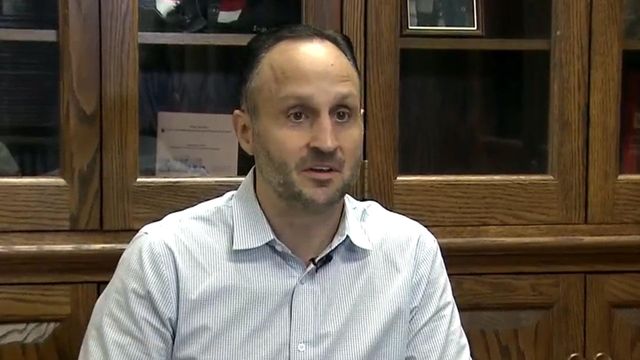NC labor commissioner: Federal vaccine mandate could cost businesses
State Labor Commissioner Josh Dobson said Thursday that he's concerned about rules the Biden administration has laid out requiring private-sector workers to be vaccinated against coronavirus, saying the mandate could hurt North Carolina businesses.
Posted — UpdatedOSHA says employers that break the rules can face fines of more than $13,000 per violation.
Dobson, a Republican elected a year ago to head the state Department of Labor, said he's been vaccinated and encourages others to get their shots as well. But a government mandate could lead to unintended consequences, he said.
"I don’t want to be combative, but this is the wrong approach," he told WRAL News. "It is wrong to me to mandate someone to receive a vaccine or get tested weekly to keep their job they have had for 10, 15, 20 years."
Mike Walden, an economist with North Carolina State University, called the vaccine mandate "probably the best compromise" to limit the spread of the virus so the nation can return to normal business activity.
"It is crucial to have an option of being tested because there are people out there who, for a variety of reasons, do not want to get vaccinated," Walden said.
But Dobson said the rules would create "an unnecessary burden" on employers, noting many are already having trouble filling vacant jobs and could also face losing staff who don't want to be vaccinated.
"I have talked to different interest groups, and they are afraid that up to 30 or 40 percent of their workforce is not going to get vaccinated – they're just going to go home and quit. And the shortages that we are facing right now, we cannot afford to do that," he said.
"The burden is going to be when the workforce walks off the job," he said. "I am not being dramatic, but that is going to happen to a certain extent."
Walden agreed checking workers' vaccination status and conducting weekly tests on those who aren't vaccinated would be a burden for many employers, but it's possible for most to get it done.
“I think that will be the big challenge – to make it efficiently managed and easy for the business," he said.
Software giant SAS Institute told all of its employees in September that anybody working at its Cary campus would need to show proof of vaccination, and 97 percent of the company's U.S. workforce is now vaccinated.
While Dobson fears that workers will quit, Walden said mandating vaccinations could draw others back to the workforce.
“There are a lot of people who just are dreadfully afraid of any interactions with people, especially in the workforce," Walden said. "This mandate is one way ... to try to provide some assurance to workers that you can come back to work and you can do it safely."
Workers themselves are divided on the idea of the federal government's vaccine mandate.
"I do not believe in mandates," Michelle Andras said. "I am not saying I am against the vaccine. I am just against the mandating of the vaccine."
Dobson said the mandate also will put added strain on the Labor Department, which has been inundated with nearly 5,000 pandemic-related complaints since March 2020, as well as complaints related to rules the Biden administration put in place in June to limit the spread of the virus in hospitals, nursing homes and other health care settings.
"We don’t get one additional resource from the federal government to do this, and that’s unfortunate," he said of trying to enforce the mandate come January. "It’s going to put an incredible burden on the compliance officers here in North Carolina."
In a statement issued Thursday morning after the new rules were announced, Dobson said the Labor Department 110 compliance officers "should be spending their time working with employers to prevent injuries, illnesses and fatalities at construction sites and manufacturing facilities rather than knocking on doors to check an employer’s vaccine records."
The Labor Department has 15 days to notify the federal government about how North Carolina will handle the new rules. Dobson said he expects legal challenges to the rules, which could affect the state's actions.
"It’s not like I am not trying to work with the Biden administration. This goes too far, in my view," he said.
• Credits
Copyright 2024 by Capitol Broadcasting Company. All rights reserved. This material may not be published, broadcast, rewritten or redistributed.





